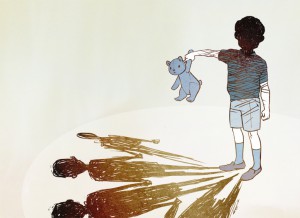An essay by William Considine, as provided by Thomas Canfield
Art by Errow Collins
The month Liam entered the fourth grade, I got called into a parents-teacher conference at the school. I pretty much knew what to expect by then. Liam’s teachers attributed his problems to some sort of learning disability, which was natural enough. They hadn’t encountered anything like it before, and the deeper they looked into the matter, the more perplexed they became.
I had my suspicions even then of course, even at the very outset. But I kept them to myself. The potential ramifications, should I prove to be right, were staggering. They extended far beyond the trials of one small child. Issues of biology and genetics and corporate grant money all converged to produce a tangle of conflicting interests, an ethical morass that offered no easy way out. So I said nothing.
The teacher, a Mr. Braeburn, was a decent enough fellow–well meaning, sincere, committed to the welfare of his students. But no one was going to accuse him of possessing any great intellect. He was a typical product of the public school system: bland and unimaginative. I sat in the office across the table from him, alone. I hadn’t told my wife about the conference. She was worked up over the issue as it was. I didn’t want to add to her distress.
Braeburn had a folder in front of him containing paperwork relating to Liam’s academic progress. He wore a jacket but no tie–his idea of a compromise between strict professionalism and a casual, folksy approach, which invited my confidence. Already I had taken a dislike to him and to the mediocrity which he represented.
“Liam really is an engaging child,” he began by saying. “Intelligent, gets along with others. His social skills are quite advanced for someone his age.” Liam was ten. I didn’t entirely understand what the phrase “quite advanced” meant and doubted that Braeburn did either. It was merely his way of sugarcoating the pill, of smoothing the approach to the “But,” which must inevitably follow. “I enjoy having him in my class and consider him one of my most promising pupils.” Braeburn glanced down at the folder. “But …”
I made an involuntary noise of disgust. I couldn’t help myself. The man was so obvious. His mind plodded along at a crawl. It was difficult to throttle back my own thoughts to a speed where I could match him. Braeburn looked startled. His mouth formed a perfect O. Then he made the best of the situation by attributing my indiscretion to a cause which was more nearly palatable.
“I understand your concern, Dr. Considine,” he assured me. Which wasn’t true. He had no idea in which direction my concern actually lay. “You feel Liam’s chances at academic success are jeopardized. That isn’t the case at all. As I said before, Liam is very intelligent and scores at the high end of all of the standardized testing. The problem–and you have no doubt observed incidents of this yourself–is this sort of mathematical anomaly. Liam has problems working with, and visualizing, the concept of ‘one’.
“He tries, I’m absolutely certain of that. It’s not for want of effort. But he possesses an innate resistance, almost a hostility, to its use and to its various applications.” Braeburn shot a nervous glance at me. Plainly he expected some sort of reaction.

You have bear, single, and you have bears, plural. Confronted by this, Liam wrestles with and, ultimately, rejects the concept of bear. He is quite at ease with bears, with more than one. Bear however, the single, isolated animal, presents some sort of challenge. Almost, I should say, a threat. The same with cats and dogs and what have you.
To read the rest of this story, check out the Mad Scientist Journal: Winter 2016 collection.
FBI File #2275:
The suspect, Dr. William Considine, remains under surveillance. A convincing case has been compiled against him already. However, criminal proceedings are not to be instituted unless and until they receive personal approval by the Director himself
The boy, Liam, currently a ward under government care, is being subjected to a battery of tests to determine whether his state and condition offer promise for Psy-Ops or other intelligence work. He would seem to be an asset with great future potential. I and my colleagues concur that no public disclosure should be made regarding his status and, indeed, that all reference of and to him should be stricken from the public record. Effectively, he will become a non-person.
Agent James Kilpatrick
Canfield aspires to worry less, for which purpose he has taken up the study of children, and to laugh more, for which purpose he has taken up the study of politicians.
Errow is a comic artist and illustrator focused on narrative work themed around worlds not quite like our own. She spends her time working with her partner on The Kinsey House webcomic and developing other comic projects when she’s not playing tag with her bear of a cat. More of her work can be found at errowcollins.wix.com/portfolio.
Follow us online: